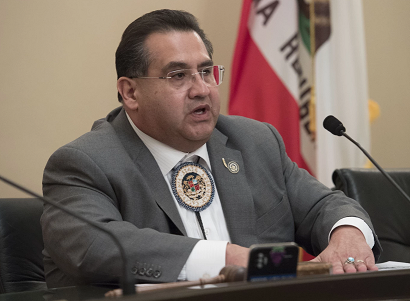
- Details
- By Native News Online Staff
Three measures to increase safety in California’s Indian Country and reduce the disparate numbers of Missing and Murdered Indigenous People (MMIP) are headed to the Senate as California works to reduce its fifth-highest in the nation unresolved MMIP case load. Assemblymember James C. Ramos (D-San Bernardino) authored the bills.
“In 2016 the National Crime Information Center reported 5,712 missing American Indian and Alaska Native women and girls in the U.S., but only 116 of those cases were logged by the National Missing and Unidentified Persons System. California is not alone in bearing the trauma of MMIP cases, but we have one of the highest numbers of uninvestigated and unresolved case numbers in the country. Despite state action in recent years to confront the violence and trauma to our families, we know we have much more to do. I am appreciative of the support of my colleagues and the administration in combatting the MMIP crisis." Ramos said.
MMIP legislation now headed to the Senate are:
- AB 1863 would require the California Highway Patrol (CHP) to develop policies and procedures related to the Feather Alert, a notification system similar to the AMBER alert used when Native Americans are missing and in danger. The Feather Alert took effect in January 2024 after passage of AB 1314 (Ramos, 2022). AB 1863 would also allow law enforcement agencies or tribal nations to request the alert, updates the definition of danger to a person’s safety, and requires CHP officials to respond to the request for alert activation within 48 hours and provide written notice to the requesting entity if the request is denied. Ramos said the changes would help ensure an effective and responsive alert system. He added the changes evolved after an informational hearing and discussions with tribes, law enforcement and CHP. It is co-sponsored by Bear River of the Rohnerville Rancheria, Pechanga Band of Mission Indians and the Yurok Tribe.
- AB 2108, the Luke Madrigal Act, requires a county social worker or probation officer to immediately notify parents or legal guardians, attorneys for parents, court-appointed special advocate, the court of jurisdiction and others when they receive information that children receiving child welfare services, including non-minor dependents, are missing from foster care.
Native American children enter the child welfare system at a rate that is 2.7 times their representation in the population, the highest of any racial group (AFDC 2020). National data shows that 85% of all missing Indigenous children over a 10-year period were endangered runaways. Runaways are especially vulnerable to becoming victims of crime. Luke Madrigal was a proud member of the Cahuilla Band of Indians and he grew up on the Soboba Indian Reservation. Madrigal was best known for giving his time, energy, and knowledge to help others, especially children. For six years, he served on his tribe’s council, and generously gave his time to the National Indian Child Welfare Association, Riverside County Tribal Alliance for American Indian Children and Families. Sponsors are the Yurok Tribe, California Tribal Families Coalition and Alliance for Children’s Rights.
- AB 2138 would establish a three-year pilot project under the Department of Justice granting California state peace officer status to qualified tribes and the officers they employ. Participating tribes include Blue Lake Rancheria, Coyote Valley Band of Pomo Indians and the Yurok Tribe. AB 2138 would require the Department of Justice (DOJ) to monitor, evaluate and support the program and allows DOJ to suspend or terminate participation in the program for gross misconduct or failure to comply with program requirements. Thirteen states and the federal government already grant peace officer status to tribal police. The Yurok Tribe and California Indian Legal Services are co-sponsors of the measure.
- AB 2695 requires the DOJ to align its records and data with the federal National Incident-Based reporting system to assist law enforcement and others understand where criminal incidents related to MMIP are occurring and also include a notation indicating whether domestic violence incidents took place in Indian Country. AB 2695 is sponsored by Attorney General Rob Bonta.
More Stories Like This
Native News Weekly (August 25, 2024): D.C. BriefsUS Presidents in Their Own Words Concerning American Indians
Federal Judge Orders ICE to Halt Use of Pepper Spray, Arrests of Peaceful Protesters in Twin Cities
Tunica-Biloxi Cultural Leader John D. Barbry Walks On
Next on Native Bidaské: Federal ICE Activity in Minneapolis: Ruth Buffalo’s Perspective
Help us defend tribal sovereignty.
At Native News Online, our mission is rooted in telling the stories that strengthen sovereignty and uplift Indigenous voices — not just at year’s end, but every single day.
Because of your generosity last year, we were able to keep our reporters on the ground in tribal communities, at national gatherings and in the halls of Congress — covering the issues that matter most to Indian Country: sovereignty, culture, education, health and economic opportunity.
That support sustained us through a tough year in 2025. Now, as we look to the year ahead, we need your help right now to ensure warrior journalism remains strong — reporting that defends tribal sovereignty, amplifies Native truth, and holds power accountable.
 The stakes couldn't be higher. Your support keeps Native voices heard, Native stories told and Native sovereignty defended.
The stakes couldn't be higher. Your support keeps Native voices heard, Native stories told and Native sovereignty defended.
Stand with Warrior Journalism today.
Levi Rickert (Potawatomi), Editor & Publisher


